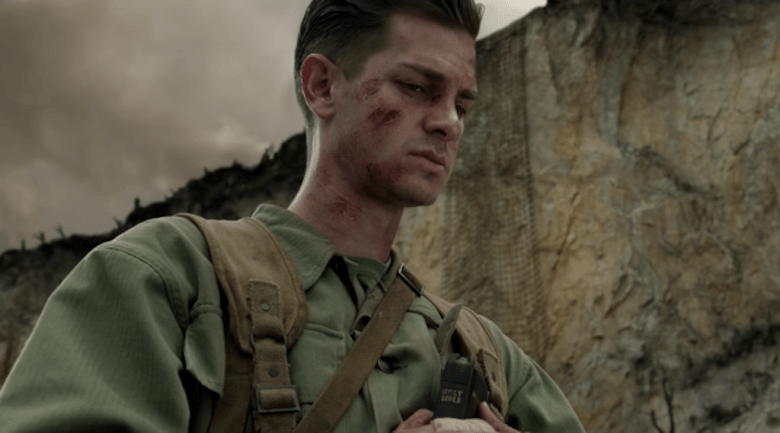Spectra Film Review: HACKSAW RIDGE
The resonance of a war film is one that can leave us either shocked, moved, or angry. Somehow, Hollywood believes that audiences all across the globe want nothing more than to see a prolific thriller centered on military actions set forth in our country. As was the case with “American Sniper” or “Lone Survivor” both of which struck box-office gold and a critical note with moviegoers. Setting aside your differences for director Mel Gibson might be a tough draw for some, but “Hacksaw Ridge” is a triumphant, brilliantly endowed war epic that reminds us why the man can direct in the first place.
Borrowing the title from behind enemy lines, “Hacksaw Ridge” highlights the moral ethics which stem from unmitigated violence toward others. Based on the unbelievable true story of real-life hero Desmond Doss, (Andrew Garfield – in his best role to date) as we are taken on his journey through World War II in a way most Americans can’t and won’t understand. Gibson is nice to introduce us to the early childhood days of Doss and his family, which consists of his younger brother Harold (Nathaniel Buzolic), his father Tom (Hugo Weaving) and mother Bertha (Rachel Griffiths), all into his adult years before he makes the decision of enlisting in the army. That also includes the full-scale romance treatment as well, between Doss and his soon-to-be-wife Dorothy Schutte (Teresa Palmer). The two look and feel as though there were plucked straight out of a cheesy, flimsy, 50s sizzle reel and it’s one of the better moments the film has to offer.
Still, it doesn’t take long before Gibson teters us away from the somber, quiet lifestyle of Doss and thrusting us in the midst of the film’s true agenda of practicing non-violence. Doss is a consciousness observer in the face of his government, meaning his beliefs forbid him for putting harm on another soul. A tactic which his commanding officers (Vince Vaughn and Sam Worthington) don’t agree with, forcing a trial against him for disobeying direct orders.
The cheesiness doesn’t seem to stop there, as much of the derived narrative provides good fodder for the motivation of our lead character. And, not to my surprise, but Doss is a patriot worth rooting for. He is eventually granted his immunity from serving with a weapon, and instead uses his talents as medic on the battlefield. A feature which is all the more impressive when you understand Doss himself never fired a single bullet.
With certainty, Gibson heightens many of the stakes in his war scenes, often jump cutting between blood splattering mutilations, melee weapon kills, and aggressive attacks. Yes, I understand that’s the plunder of war, but “Ridge,” at it’s core, almost forgets the message it’s trying to superimpose about assault and often times I came in and out of the film’s message, because I simply felt it couldn’t make up it’s own mind. Not to worry though, Garfield is the best thing in the movie as Doss. Who knew that taking a step back from comic book violence would be the best thing for the actor? Weaving also has a fine supporting role as Doss’s troubled PTSD father-figure, and Vaughn is ironically not laughable as one would expect him to be in such a serious role.
Combining all those factors, and a director hungry for the limelight once more, “Hacksaw Ridge” is a fine piece of cinema that moviegoers should take in. Because even though, at times, it may seem like the movie is losing sight of the overall message, Gibson always finds a way to bring it back on a viable path of redemption. Much like Doss did in real life, Gibson takes care of his passion with a devoted sense of authority, making this one of the best war movies in quite some time. B+


